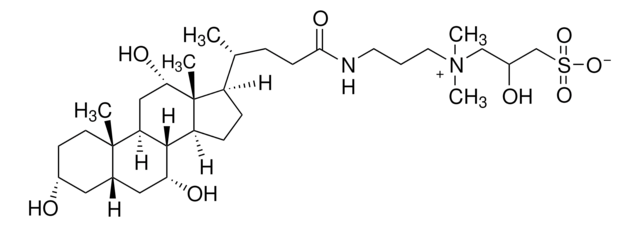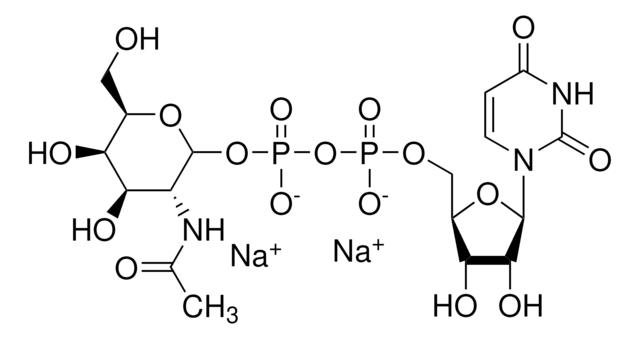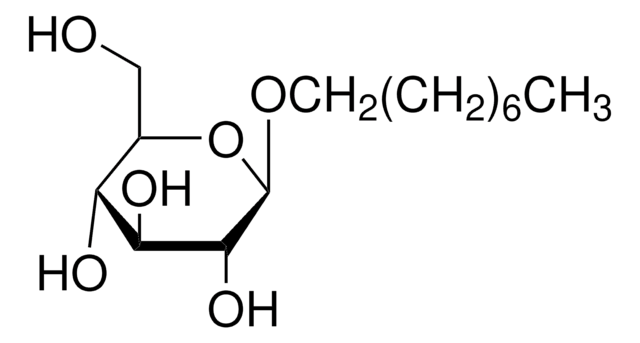C4695
CHAPSO
BioXtra
Synonym(s):
3-([3-Cholamidopropyl]dimethylammonio)-2-hydroxy-1-propanesulfonate
About This Item
Recommended Products
description
zwitterionic
Quality Level
product line
BioXtra
Assay
≥98.0% (TLC)
form
powder
mol wt
micellar avg mol wt 7000
aggregation number
11
impurities
≤0.0005% Phosphorus (P)
≤0.1% Insoluble matter
ign. residue
≤0.1%
CMC
8 mM (20-25°C)
8 mM (micellar weight =9960)
mp
184-186 °C (lit.)
transition temp
cloud point 90 °C
solubility
H2O: 0.1 M, clear, colorless
anion traces
chloride (Cl-): ≤0.05%
sulfate (SO42-): ≤0.05%
cation traces
Al: ≤0.0005%
Ca: ≤0.0005%
Cu: ≤0.0005%
Fe: ≤0.0005%
K: ≤0.005%
Mg: ≤0.0005%
NH4+: ≤0.05%
Na: ≤0.01%
Pb: ≤0.001%
Zn: ≤0.0005%
SMILES string
[H][C@@]12C[C@H](O)CC[C@]1(C)[C@@]3([H])C[C@H](O)[C@]4(C)[C@]([H])(CC[C@@]4([H])[C@]3([H])[C@H](O)C2)[C@H](C)CCC(=O)NCCC[N+](C)(C)CC(O)CS([O-])(=O)=O
InChI
1S/C32H58N2O8S/c1-20(7-10-29(39)33-13-6-14-34(4,5)18-23(36)19-43(40,41)42)24-8-9-25-30-26(17-28(38)32(24,25)3)31(2)12-11-22(35)15-21(31)16-27(30)37/h20-28,30,35-38H,6-19H2,1-5H3,(H-,33,39,40,41,42)/t20-,21+,22-,23?,24-,25+,26+,27-,28+,30+,31+,32-/m1/s1
InChI key
GUQQBLRVXOUDTN-XOHPMCGNSA-N
Looking for similar products? Visit Product Comparison Guide
General description
Application
Storage Class Code
11 - Combustible Solids
WGK
WGK 3
Personal Protective Equipment
Certificates of Analysis (COA)
Search for Certificates of Analysis (COA) by entering the products Lot/Batch Number. Lot and Batch Numbers can be found on a product’s label following the words ‘Lot’ or ‘Batch’.
Already Own This Product?
Find documentation for the products that you have recently purchased in the Document Library.
Customers Also Viewed
Our team of scientists has experience in all areas of research including Life Science, Material Science, Chemical Synthesis, Chromatography, Analytical and many others.
Contact Technical Service









